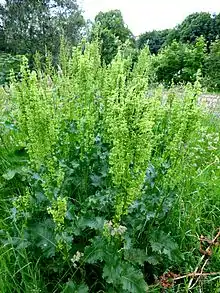| Rumex confertus | |
|---|---|
 | |
| Scientific classification | |
| Kingdom: | Plantae |
| Clade: | Tracheophytes |
| Clade: | Angiosperms |
| Clade: | Eudicots |
| Order: | Caryophyllales |
| Family: | Polygonaceae |
| Genus: | Rumex |
| Species: | R. confertus |
| Binomial name | |
| Rumex confertus Willd. | |
Rumex confertus (Russian dock) is a flowering plant species in the family Polygonaceae. It grows quickly, reproduces from rhizomes and seed, and produces large quantities of viable seed. Its seed is adapted for wind and water dispersal and exhibits a high rate of germination.
Distribution
Rumex confertus flowering usually occurs late spring-summer. Along roadsides, waste places, meadows, river valleys. This species is common in central and Eastern Europe, can be expected elsewhere in mild climate regions of North America.[1]
Uses
The Rumex L. (dock) species have been used in medical treatment for many centuries.[2]
References
- ↑ "rumex confertus willd: Topics by WorldWideScience.org". worldwidescience.org. Retrieved 2019-10-10.
- ↑ Raw, DEANE in Edible; Grain/Nuts/Seeds; Herb, Greens/Pot; Medicinal; Uses, Plant; plants; Roots/Tubers/Corms; Vegetable (2012-03-23). "Rumex Ruminations". Eat The Weeds and other things, too. Retrieved 2019-10-10.
- "Plants Profile for Rumex confertus (Asiatic dock)". plants.usda.gov. Retrieved 2019-10-10.
This article is issued from Wikipedia. The text is licensed under Creative Commons - Attribution - Sharealike. Additional terms may apply for the media files.